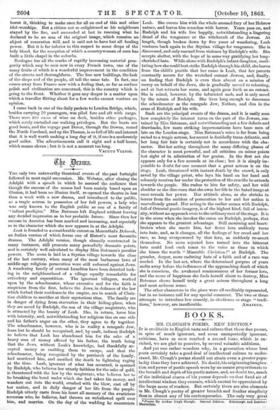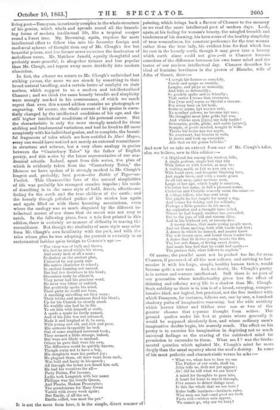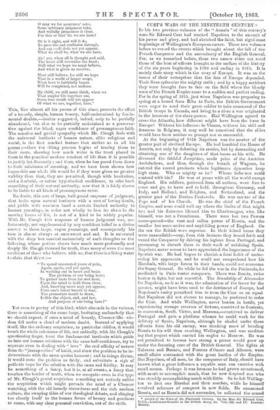BOOKS.
MR. CLOUGH'S POEMS. NEW EDITION.* IT is creditable to English taste and culture that these fine poems, in spite of much ignorant, and some unexpectedly ignorant, criticism, have so soon reached a second issue, which is en- riched, we are glad to perceive, by several valuable additions.
And yet one rather wonders why, in a generation whose best poets certainly take a good deal of intellectual culture to under- stand, Mr. Clough's poems should not attain even a greater popu- larity than they have achieved. No doubt, his originatingimagina- tion and power of poetic speech were by no means proportionate to the breadth and depth of his poetic nature, and, no doubt too, much of the individual charm of his poems depends on that fixed air of intellectual wisdom they contain, which cannot be appreciated by the large mass of readers. But certainly there are also elements in Mr. Clough's poetry of greater breadth and franker simplicity than in almost any of his contemporaries. The only very great
• Poems. By Arthur Hugh Clough. Second Edition. Edinburgh and London: Macmillan.
living poet—Tennyson, is curiously complex in the whole structure of his genius, which winds and spreads round all the branch- ing forms of modern intellectual life, like a tropical creeper round a forest tree. Mr. Browning, again, requires far more intellectual effort to follow him into his favourite foreign and medieval spheres of thought than any of Mr. Clough's few but beautiful poems, and the former never exercises the fascination of melodious verse. Mr. Matthew Arnold, equally thoughtful and probably more graceful, is altogether thinner and less popular than Mr. Clough, and tapers away more decidedly into modern classicism.
In fact, the oftener we return to Mr. Clough's unfinished but
striking poems, the more we are struck by something in their broad natural handling, and a certain lustre of sunlight on their surface, which suggest to us a modern and intellectualized Chaucer ; and we think the same homely breadth and simplicity were strongly marked in his countenance, of which we much regret that even this second edition contains no photograph or engraving. Of course, the whole essence of his genius is essen- tially changed by the intellectual conditions of his age, and the still higher intellectual conditions of his personal career. But the characteristic is only the more strongly marked for these striking and fundamental variations, and had he lived to fill more completely with his individual genius, and to complete, the beauti- ful fragments of tales which are here entitled In Mani Magno, every one would have noticed not merely an external resemblance in structure and scheme, but a very close analogy in genius
between the "Canterbury Tales" by the father of English poetry, and this series by the latest representative of our aca- demical schools. Indeed, apart from this series, the plan of which is evidently taken from the "Canterbury Tales," the likeness we have spoken of is strongly mnrked in Mr. Clough's
longest and, probably, best poem—the Bothie of Toper-na- Vuolich. This Chaucer-like love of the natural simplicities of life was probably his strongest creative impulse ; his mode of describing is in the same style of bold, direct, affectionate feeling for the earth and the true children of the earth ; and the homely though polished pathos of his stories has again and again filled us with these haunting associations, even where the analogy was so much disguised by the different in- tellectual accent of our times that its secret was not easy to catch. In the following piece, from a tale first printed in this edition, there is certainly no manner of difficulty in tracing the resemblance. But though the similarity of mere style may arise from Mr. Clough's own familiarity with the poet, and with the tales whose plan he was adopting, the portrait is certainly in an ecclesiastical fashion quite foreign to Chaucer's age :— "The vicar was of bulk and thews,
Six feet he stood within his shoes, And every inch of all a man ; Ecelesiast on the ancient plan, Unforced by any party rule His native character to school; In ancient learning not unread, But had few doctrines in his head ; Dissenters truly he abhorr'd, They never had his gracious word.
He ne'er was bitter or unkind, But positively spoke his mind.
Their piety he could not bear, A sneaking snivelling set they were : Their tricks and meanness fired his blood; Up for his Charch he stoutly stood.
No worldly aim had he in life To set him with himself at strife.
A spade a spade he freely named, And of his joke was not ashamed, Made it and laughed at it, be sere, With young and old, and rich and poor.
His sermons frequently he took Out of some standard reverend book; They seemed a little strange, indeed, But were not likely to mislead.
Others he gave that were his own, The difference could be quickly known.
Though sorry not to have a boy, His daughters were his perfect joy; He plagued them, oft drew tears from each, Was bold and hasty in his speech ; All through the house you heard him call,
He had his vocatives for all—
Patty Patina, Pat became, Lydia took Languish with her name Philippa was the Gentle Queen, And Phoebe, Madam Proserpine; The pseudonyms for Mary Gwen Varied with every week again;
But Emily, of all the set, Emilia called, was most the pet."
It is not the mere form here, it is the simple, direct manner of
painting, which brings back a flavour of Chaucer to the memory as we read the more intellectual poet of modern days. Look, again, at his feeling for woman's beauty, the mingled breadth and tenderness of his drawing, his keen sense of the healthy simplicity of true womanliness, his constant preference for the true woman rather than the true lady, his evident bias for that which has its root in the homely earth, though it may grow into a beauty which earth alone could not give ;—it is Chaucer become conscious of the difference between his own inner mind and the tastes of our modern intellectual day. Chaucer describes his ideal of feminine loveliness in the person of Blanche, wife of John of Gaunt, thus :-
" I sawgh hir daunce so comeloly,
Carole and synge so swetely, Laughe, and pleye so womanly, And loko so debonairly; So goodely spoke and so friendly ; That certes I trowe that evermore, Nas [was not] Boyne so blysful a tresore.
For every hoer on hir hede, Sothe to seyne, hyt nas not redo, Ne nouthor yelowe, no browne hyt nas ; Me thoughte most lyko goldo hyt was.
And whiche eyen [eyes] my lady hadde! Debonaire, goode, glade, and Betide [grave], Symple, of geode mochel, nought to wide.
Therto hir look° nas not asyde, No ovortwert, but beactte to web, It drewe and took up everydole Alle that on hir gonna beholde."
And now let us take an extract from one of Mr. Clough's tales, also, we believe, new in this edition :—
" A Highland inn among the western hills,
A single parlour, single bed that fills With fisher or with tourist, as may be ; A waiting-maid, as fair as you can see, With hazel eyes, and frequent blushing face, And ample brow, and with a rustic grace In all her easy, quiet motions seen, Largo of her age, which haply is nineteen, Christian her name, in full a pleasant name, Christian and Christie scarcely seem the same ;- A college fellow, who has sent away The pupils he has taught for many a day, And comes for fishing and for solitude, Perhaps a little pensive in his mood,
An aspiration and a thought have failed,
Where ho had hoped, another has prevailed, But to the joys of hill and stream alive, And in his boyhood yet, at twenty-five.
A merry dance, that made young people meet, And set them moving, both with hands and feet ; A dance in which he danced, and nearer knew The soft brown eyes, and found them tender too.
A dance that lit in two young hearts the fire, The low soft flame, of loving sweet desire,
And made him feel that he could feel again;—
The preface thiti, what follows to explain."
Of course, the parallel must not be pushed too far, for even
Chaucer, if possessed of all the new culture, and striving to har- monize it with his large, simple, healthy human tastes, would become quite a new man. And, no doubt, Mr. Clough's poetry is in nature and essence intellectual. Still there is no poet of our generation whose intellectuality gives less the effect of thinning and refining away life to a shadow than Mr. Clough.
Such subtlety as there is in him is of a broad, sweeping, compre- hensive kind, not logical, but practical, not the fine instinct with which Tennyson, for instance, follows out, one by one, a hundred shadowy paths of imaginative reasoning, but the wide subtlety which hovers hither and thither over one or two of the greater chasms that separate thought from action. The ground quakes under his feet at points where generally it would be supposed absolutely firm, and where ordinary men's imaginative doubts begin, his scarcely reach. The effect on his poetry is to exercise his imagination in depicting not so much universal feelings as the craving of the cultivated mind for permission to surrender to them. What am I? was the funda- mental question which agitated Mr. Clough's mind far more
deeply than the usual mystery about the soul's destiny. In some
of his most pathetic and characteristic verses he asks :—
" What we, when face to face we see The Father of our souls, shall be, John tells ns, doth not yet appear ; Ah! did he tell what we are hero? A mind for thoughts to pass into, A heart for loves to travel through, Five senses to detect things near, Is this the whole that we are here ? Rules baffle instincts—instincts rules, Wise men are bad—and good are fools. Facts evil—wishes vain appear, We cannot go, why are we here ?
0 may we for assurance' sake, Some arbitrary judgment take, And wilfully pronounce it clear, For this or that 'tis we are here ?
Or is it right, and will it do, To pace the sad confusion through, And say :—It doth not yet appear, What we shall be, what we are here.
Ah ! yet, when all is thought and said, The heart still overrules the head; Still what we hope we must believe, And what is given us receive; Must still believe, for still we hope That in a world of larger scope, What here is faithfully begun Will be completed, not undone.
My child, we still must think, when we That ampler life together see, Some true result will yet appear Of what we are, together, here."
This, like almost all his poems of this class, presents die effect of a homely, simple, human beauty, half-undermined by funda- mental doubts,—doubts suggested, indeed, only to be partially abandoned, but also to be partially maintained as a preserva- tive against the blind, eager confidence of presumptuous faith. The massive and genial sympathy which Mr. Clough feels with the universal instincts of human nature, alike religious and social, is the first marked feature that strikes us in all his poems ;—then the sifting process begins of tracing them to their roots, showing how much wider is the trust placed in them in the practical modern conduct of life than it is possible to justify intellectually ; and then, when be has pared them down to their minimum of meaning, and we have been shown how impossible our whole life would be if they were given no greater validity than that, they are permitted, though with hesitation, and a doubtful, or rather hypothetical confidence, to take back something of their natural authority, now that it is fairly shown to be liable to all kinds of presumptuous error.
No doubt, this sort of large, half-genial suspense of judgment, that looks upon natural instincts with a sort of loving.doubt, and yields with cautious hand a certain limited authority to human yearnings, in order not wholly to lose its share in the moving forces of life, is not of a kind to be widely popular. With Mr. Clough this suspense of human judgment was, un- fortunately, not supplemented by any confident belief in a divine answer to these large, vague yearnings, and consequently his tone is almost always at once sweet and sad. It is saturated with the deep but musical melancholy of such thoughts as the following, whose pathos shows how much more profoundly and deeply Mr. Clough thirsted for truth, than many of even the most confident of those who believe, with us, that there is a living water to slake that thirst :— " To spend uncounted years of pain, Again, again, and yet again,
In working out in heart and brain
The problem of our being here; To gather facts from far and near, Upon the mind to hold them clear, And, knowing more may yet appear, Unto one's latest breath to fear, The premature result to draw, Is this the object, end, and law,
And purpose of our being here ?"
Yet even in poetry of this kind, which abounds in the volume, there is something of the same large, hesitating melancholy that we should expect, if once a mind of homely, Chaucer-like wis- dom fell under a cloud of modern doubt. Instead of applying itself, like the ordinary scepticism, to particular riddles, it would touch the whole substance of life, not unkindly, with Mr. Clough's questioning finger, treat the fundamental instincts which guide us into our human relations with the same half-confidence, try to separate even in dealing with " love" the real affinity of nature from the "juxtaposition" of habit, and show the problem to be in- determinate with the same quaint humour ; and in things divine, it would state the problem as fairly, and substitute a sigh of pathetic hope for the solution with the same sad fidelity. It may be something of a fancy, but it is, at all events, a fancy that touches the border of truth, when we recognize even in the typo of Mr. Clough's genial scepticism something not entirely unlike the scepticism which might pervade the mind of a Chaucer watching, with the old homely shrewdness and the rich modern culture, the swaying tides of our theological debate, and clinging too closely itself to the human forms of beauty and goodness to come, with any clear personal conviction, out of the strife.
































 Previous page
Previous page